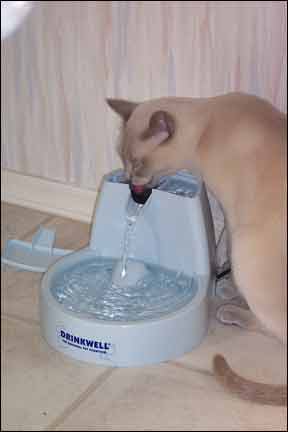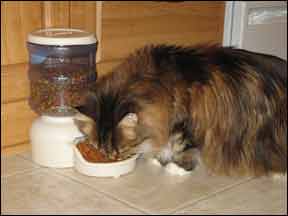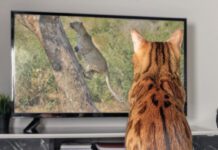Susan McDaniels was having a problem getting her cat, Starfish, to drink enough water. Starfish ignored the bowls of fresh water that were strategically placed around the house, preferring instead to drink water from a drippy faucet.
That’s when McDaniels had an idea. What if she could provide fresh, running water for Starfish all the time? “I thought it would be a novel idea to get an automatic waterer for my cat,” the Santa Barbara, California, resident remembers. “Nothing else was working.”

288
McDaniels went online and purchased an electric waterer that doubled as an attractive fountain. Most importantly, her cat began to drink plenty of water. “Starfish finds the fountain to be very entertaining, and it helped with water consumption,” she says.
Stationary or Automatic? Every cat needs a food and water dish, but which one best fits her needs? We’re all familiar with the typical stationary dishes — the ones with the cute colors and designs, or your cat’s name printed on the side. These types of dishes have been around for many years and are fine for most cats. Automatic feeders and waterers, on the other hand, can aid cats that have health-related or behavioral issues or serve as a convenience for owners.
To help determine whether an automatic feeder and waterer would be beneficial for your cat, ask yourself these questions:
- Am I away from home for at least several hours each day?
- Does my cat need to eat at a certain time (i.e. because of a medical condition like diabetes)?
- Do I need to feed my cat a specific portion of food at each meal (for medical reasons or for weight control)?
- Does my cat jump onto the sink in order to drink water from the faucet?
If you answered yes to any of these questions, then read on to learn more about the various types of automatic feeders and waterers, and how to select the right style for your particular cat.
There are two main types of automatic feeders and waterers, and we’ll discuss their differences.

288
Gravity-Style Feeders and Waterers. The gravity-style feeder consists of a plastic canister that holds a supply of dry food and snaps onto the base (or bowl) of the unit. Since cats receive unrestricted access to dry food with a gravity-style feeder, it’s important to monitor your pet’s weight to ensure that she doesn’t start packing on the pounds.
The gravity-style waterer is also a two-piece unit, with a plastic canister to hold the water and a detachable reservoir (bowl). Both the canister and reservoir should be thoroughly cleaned at least once a week to remove bacteria, mold and algae buildup. These types of feeders and waterers are simple in design, easy to clean and inexpensive. They can be found at all pet stores or through online pet retailers.
Electronic Feeders. Electronic feeders are typically battery-operated or electric units that plug into a standard household outlet (make sure the product is UL listed for safety). The automatic feeder uses a programmable timer so that your cat receives a single meal at a predetermined time, which is crucial for diabetic or senior cats. Electronic feeders are more expensive than their gravity-style counterparts, but offer a key advantage: They are useful if you plan on being away from home on a regular basis and want to maintain consistent feeding times and portion control for your cat.
Just remember: It’s important that you never leave your cat alone for more than a day without someone checking in on her. Some people assume that cats are completely self-sufficient, but that’s simply not the case. Your cat will not only miss the human interaction but depends on you for her safety and well-being. There’s always a chance that she may become injured or ill while you are gone and need immediate medical attention.
If you don’t have a reliable neighbor or family member nearby, consider hiring a pet sitter the next time you go out of town. Organizations such as Pet Sitters International (336-983-9222, or online at www.petsit.com) can help you find a professional pet sitter in your area. (Please see related article in CatWatch, February 2012.)
A Way to Provide Running Water. Like humans, all cats need fresh drinking water in order to stay healthy. But many cats don’t get enough H2O simply because they don’t like the taste of stagnant tap water in their bowl; they would prefer to drink fresh, running water from the faucet. While some may think it’s cute when their cats jump into the kitchen or bathroom sink every time they’re thirsty, some of us would prefer that they didn’t do this. An electronic waterer solves this problem by providing a continuous supply of fresh drinking water for your cat.
Many units can hold a gallon or more of water and include a waterfall to aerate the water with healthful oxygen. Electronic waterers come with a replaceable charcoal filter, don’t require a separate water line and use very little electricity. As with gravity-style waterers, it’s important to clean your electronic waterer frequently and replace the filter at least every six to eight weeks.
Whether you choose a simple gravity-style unit or an electronic one, automatic feeders and waterers provide a convenient way to ensure that your cat is getting all her nutritional needs met when you’re away from home.



